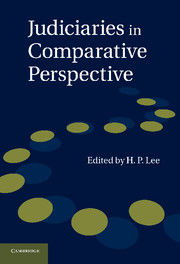Book contents
- Frontmatter
- Contents
- Contributors
- Foreword
- Preface
- Table of cases
- Table of statutes
- Part I
- Part II
- Part III
- 8 Judges’ freedom of speech
- 9 Judges and free speech in Canada
- 10 Judges and free speech in New Zealand
- 11 The judiciary and freedom of speech in South Africa
- 12 Judges and free speech in the United Kingdom
- 13 The criticism and speech of judges in the United States
- Part IV
- Part V
- Part VI
- Index
- References
8 - Judges’ freedom of speech
Australia
from Part III
Published online by Cambridge University Press: 07 September 2011
- Frontmatter
- Contents
- Contributors
- Foreword
- Preface
- Table of cases
- Table of statutes
- Part I
- Part II
- Part III
- 8 Judges’ freedom of speech
- 9 Judges and free speech in Canada
- 10 Judges and free speech in New Zealand
- 11 The judiciary and freedom of speech in South Africa
- 12 Judges and free speech in the United Kingdom
- 13 The criticism and speech of judges in the United States
- Part IV
- Part V
- Part VI
- Index
- References
Summary
In April 2001 High Court Justice Michael Kirby addressed a university graduation ceremony in Adelaide. In what was described as a ‘passionate defence of Australia’s public education system’ the judge called upon the Commonwealth government to boost funding for state schools. Not surprisingly his call was roundly endorsed by the Australian Education Union and praised by the Opposition spokesperson Mr Michael Lee as a timely intervention. The Attorney-General, Mr Daryl Williams, and the Prime Minister, Mr John Howard, bluntly responded to this incursion into a public policy debate by a member of the judiciary. The Attorney-General said that:
While I am a supporter of the judiciary raising community awareness about legal issues by explaining the roles of the courts and taking the lead in defending themselves, I do not support judges commenting publicly on political contentious issues.
The Prime Minister was less restrained in his condemnation of Justice Kirby’s actions:
The comments that Mr Justice Michael Kirby made at the weekend regarding school funding were a direct intervention into a partisan political debate. It’s not appropriate for a High Court judge to involve himself in something that is so blatantly and obviously a matter of debate between the two political parties.
Reflecting on the incident on the eve of his retirement from the High Court in 2009, Justice Kirby conceded that the intervention was ‘a mistake, looking back on it’. Nevertheless he believed there was value in engaging with the public as a sitting judge.
I have tried to engage the Australian community and talk about the law and about its directions and about its problems, problems of being a judge, the decision-making process. So that you’ve got to put into the balance the occasional error, for which I say mea culpa, against the value of a more transparent approach to the law.
- Type
- Chapter
- Information
- Judiciaries in Comparative Perspective , pp. 153 - 174Publisher: Cambridge University PressPrint publication year: 2011

